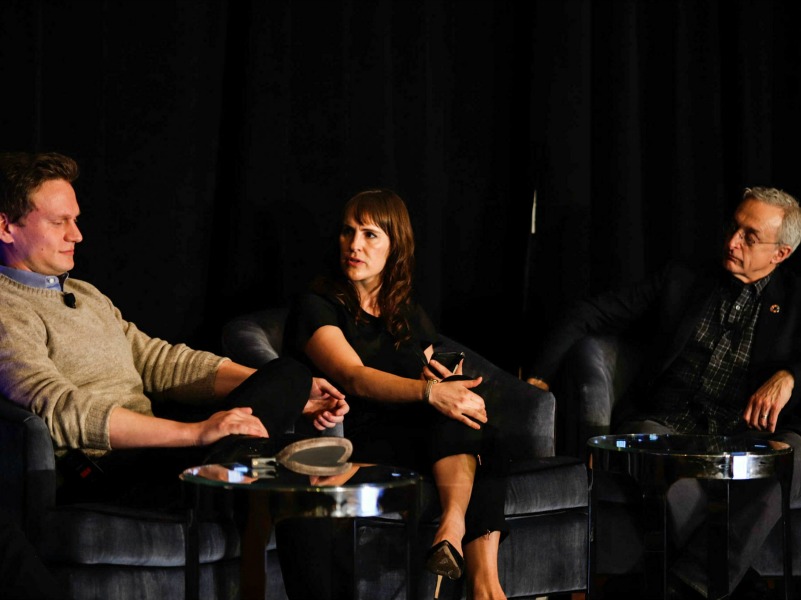Paul Holmes 13 Feb 2018 // 9:18PM GMT

NEW YORK—A consumer and regulatory backlash is brewing for Facebook and other technology and media platforms as their role in business, politics and society becomes increasingly influential, a panel of technology and communications experts told the audience at our North American In2 Summit in New York this afternoon.
During a panel on The Future of Digital Transformation for Media, Brands + Politics, led by Aaron Strout, chief marketing officer at W2O, three experts considered that the technology driving highluy targeted political and commercial messaging was becoming increasingly problematic.
David Kirkpatrick, former Fortune journalist and founder and CEO of Techonomy, kicked off the discussion on a broadly positive note: “I am a huge optimist about the big trends in the world. The world by any objective measure is getting radically better, radically fast. The big picture story is so positive.”
But Teddy Goff, cofounder of Precision and former digital director for both Obama presidential campaigns, was quick to acknowledge both the upside and downside of the new technologies he harnessed on the campaign trail. “It seemed like we were democratizing politics and giving people at seat at the table. But those same capabilities can be used to ferment total chaos and spread misinformation. For me the core question is how we can make sure that the platforms can be adapted so they make a positive contribution.”
On that score, Kirkpatrick saw a looming problem. “It is amazing to me how important the question of how Facebook evolves is to answering these questions about the future of democracy. The influence of Facebook is disproportionate, particularly since it’s one person’s company operating for profit and without oversight.
“I think government has to get involved in these platforms. Facebook is the public square of society in 200 countries and it’s completely unregulated. This is a societal question.”
The challenge is not only in th3e political realm, according to Joanna O’Donnell, vp and principal analyst at Forrester. “I have been a huge believer in the power of data and technology in advertising, but I feel like we are going a little bit off the rails. If you think about disruptive business models and the impact on global brands, fragmented modes of sales and distribution, the evolving expectations of consumers when it comes to advertising, and throw in the fact that digital advertising is crappy, I don’t know how you build brand equity in that environment.”
Surprisingly, all three panellists were concerned that targeting and personalization were becoming problematic. Said O’Donnell, “It feels to me that in our pursuit of hyper-personalization we have lost sight of the consumer, and the way the consumer is experiencing our advertising. You need to know a ton about your consumer, but what you sometimes need to do is just say no, to resist the temptation to put their name in the ad, to send them the same information about that pair of pants over nine months.”
Goff agreed, telling the audience that eight years ago he could not have imagined himself saying this, but “there’s a lot you don’t want to personalize. There are all these limitations to addressability. You should be careful not to over-invest in addressability.”
Said Kirkpatrick: “I think targeting in general may be in jeopardy, certainly in developed countries like the United States and Europe. You may see people come to prefer platforms where they don’t feel as if they are being targeted.”
He pointed to a recent Financial Times article suggesting that Twitter’s ad growth might be in part a result of the fact that its advertising is less targeted. “Snap is benefiting from the same trend. They are showing mass market ads.
“If you are P&G and Unilever you are looking at these platforms and you see chaos, you have no control over what’s happening to your brands,” said O’Donnell. Although she also suggested that the panel consider Amazon. Two-thirds of American households are now Amazon Prime customers, and 30% of product searches now originate on Amazon—which means Amazon is becoming a major media platform, and gathering massive amounts of consumer data.
“Almost all consumers still have a positive view of Amazon,” said Kirkpatrick, who suggested one possible explanation. “One reason they are exempt from this criticism, though, is that politics doesn’t happen there at all.”
But even Amazon could face a backlash, the panel agreed.
“A very interesting question is going to be whether they look at Facebook and see the problems there and learn from that,” said Goff. He cautioned that home devices like Alexa could create a tipping point for a company that has largely avoided the problems faced by Facebook. “Alexa is listening to people in the real world, which is very different from tracking their movements online. Consumers will have to figure out whether there’s a point that they revolt.”
In conclusion, Goff offered the following summary: “I think the Internet can make the world a better place or a worse place. It’s our job to make sure we make it a better one.”



































.jpg)



















